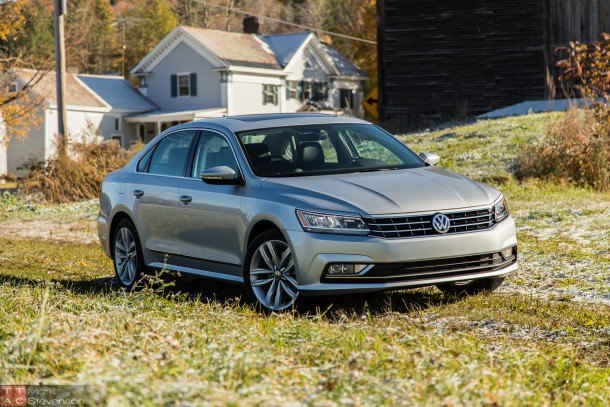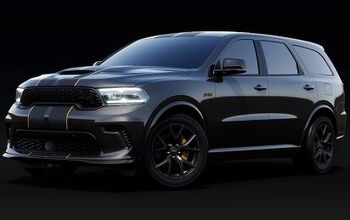Volkswagen Cleared for Big European Diesel Fix; Company Claims No Power or Mileage Loss

Volkswagen can start hauling the first of 800,000 Passat, CC and Eos models off of European streets after a German regulator granted approval to the automaker’s diesel emissions fix.
The Federal Motor Transport Authority (KBA) says there’s nothing wrong with the plan to bring 2.0-liter diesel versions of those models into compliance with pollution laws. No doubt Volkswagen execs are happy to cross off another thing off their “to do” list.
About 8.5 million vehicles were sidelined by the company’s diesel emissions scandal, but removing their emissions-cheating “defeat devices” has been a slow, painful and wildly expensive process. In the U.S., the automaker plans to finalize a buyback program for nearly 500,000 vehicles by mid-summer.
Unlike most recalled U.S. vehicles, this European crop won’t be spirited away to the automotive afterlife, leaving owners holding a pile of company cash. Volkswagen promises a “retrofit campaign” that allows owners to drive their diesel to a dealer or authorized partner for the fix. They’ll even get a free “mobility option” to get them around while the diesel docs work on their car. (This sounds like a loaner, but being Europe, there’s still a chance they’ll hand you a bike.)
After these 800,000 vehicles clear out, another 2.0-liter recall will begin.
In its official release, the automaker gave few details on its “technical solution,” instead assuring owners that, “Following the retrofit, the cars will meet all legal requirements.”
The U.S. recall taught us that older models were harder to retrofit, and risked becoming slower and thirstier once fixed. Volkswagen doesn’t hint any any of those issues for the European recall.
“The KBA has also confirmed unequivocally that the technical solutions for these models will not result in any changes to the fuel consumption, performance or noise emissions of the vehicles concerned,” the automaker said in a release. “The KBA had previously confirmed this for all of the other vehicles for which the recall has been approved to date.”
[Image: © 2015 Mark Stevenson/The Truth About Cars]

More by Steph Willems
Latest Car Reviews
Read moreLatest Product Reviews
Read moreRecent Comments
- Mike-NB2 This is a mostly uninformed vote, but I'll go with the Mazda 3 too.I haven't driven a new Civic, so I can't say anything about it, but two weeks ago I had a 2023 Corolla as a rental. While I can understand why so many people buy these, I was surprised at how bad the CVT is. Many rentals I've driven have a CVT and while I know it has one and can tell, they aren't usually too bad. I'd never own a car with a CVT, but I can live with one as a rental. But the Corolla's CVT was terrible. It was like it screamed "CVT!" the whole time. On the highway with cruise control on, I could feel it adjusting to track the set speed. Passing on the highway (two-lane) was risky. The engine isn't under-powered, but the CVT makes it seem that way.A minor complaint is about the steering. It's waaaay over-assisted. At low speeds, it's like a 70s LTD with one-finger effort. Maybe that's deliberate though, given the Corolla's demographic.
- Mike-NB2 2019 Ranger - 30,000 miles / 50,000 km. Nothing but oil changes. Original tires are being replaced a week from Wednesday. (Not all that mileage is on the original A/S tires. I put dedicated winter rims/tires on it every winter.)2024 - Golf R - 1700 miles / 2800 km. Not really broken in yet. Nothing but gas in the tank.
- SaulTigh I've got a 2014 F150 with 87K on the clock and have spent exactly $4,180.77 in maintenance and repairs in that time. That's pretty hard to beat.Hard to say on my 2019 Mercedes, because I prepaid for three years of service (B,A,B) and am getting the last of those at the end of the month. Did just drop $1,700 on new Michelins for it at Tire Rack. Tires for the F150 late last year were under $700, so I'd say the Benz is roughly 2 to 3 times as pricy for anything over the Ford.I have the F150 serviced at a large independent shop, the Benz at the dealership.
- Bike Rather have a union negotiating my pay rises with inflation at the moment.
- Bike Poor Redapple won't be sitting down for a while after opening that can of Whiparse


































Comments
Join the conversation
“The KBA has also confirmed unequivocally that the technical solutions for these models will not result in any changes to the fuel consumption, performance or noise emissions of the vehicles concerned...” That leaves durability, and/or cost, and/or DEF consumption. Obviously, VW is eating the cost of this repair, and durability is TBD. So my guess is that VW cheated solely due to cost containment, which hasn't worked out so well.
Laughable. All TDI Amaroks in Australia have already been "fixed", perhaps since OZ has the loosest emissions standards this side of the Congo. All they're doing is removing the "cheat device", and away they go. Full dirty emissions, all the time.